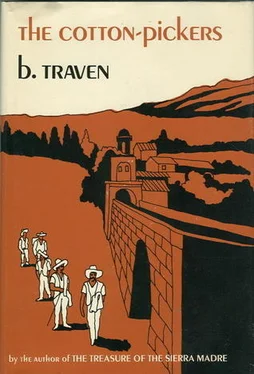B. Traven - The Cotton-Pickers
Здесь есть возможность читать онлайн «B. Traven - The Cotton-Pickers» весь текст электронной книги совершенно бесплатно (целиком полную версию без сокращений). В некоторых случаях можно слушать аудио, скачать через торрент в формате fb2 и присутствует краткое содержание. Год выпуска: 1969, Издательство: Hill and Wang, Жанр: Проза, на английском языке. Описание произведения, (предисловие) а так же отзывы посетителей доступны на портале библиотеки ЛибКат.
- Название:The Cotton-Pickers
- Автор:
- Издательство:Hill and Wang
- Жанр:
- Год:1969
- ISBN:нет данных
- Рейтинг книги:3 / 5. Голосов: 1
-
Избранное:Добавить в избранное
- Отзывы:
-
Ваша оценка:
- 60
- 1
- 2
- 3
- 4
- 5
The Cotton-Pickers: краткое содержание, описание и аннотация
Предлагаем к чтению аннотацию, описание, краткое содержание или предисловие (зависит от того, что написал сам автор книги «The Cotton-Pickers»). Если вы не нашли необходимую информацию о книге — напишите в комментариях, мы постараемся отыскать её.
—Book World
The Cotton-Pickers — читать онлайн бесплатно полную книгу (весь текст) целиком
Ниже представлен текст книги, разбитый по страницам. Система сохранения места последней прочитанной страницы, позволяет с удобством читать онлайн бесплатно книгу «The Cotton-Pickers», без необходимости каждый раз заново искать на чём Вы остановились. Поставьте закладку, и сможете в любой момент перейти на страницу, на которой закончили чтение.
Интервал:
Закладка:
Just as they were marched off, Morales returned to the scene. He had been relieved for three hours and was just coming back to his post. When he heard what had happened, he shouted inside: “You son-of-a-bitch in there, now you’ll be in for it. Just you see! We’ve only been playing so far, but we can change our tune.” And away he went to the union office.
Within ten minutes the union Secretary arrived at the police station and demanded to see Inspector Lamas. “I want a few words with him. He must be drunk!”
The Inspector was summoned. When he arrived the Secretary then asked for the Police Superintendent, who came at once. He was quite disturbed when he saw the union Secretary, and he got right down to business.
“Why did you strike the picket?” the Superintendent asked Inspector Lamas.
“He was insulting people in the café.”
The Superintendent looked at him, enraged. “What authority have you to strike a man who does nothing more than insult someone?”
Lamas was about to reply but the Superintendent cut him short. “Don’t you know your regulations?” He turned to the clerk. “Record this: ‘Lamas doesn’t know his regulations’!”
Then he faced Lamas. “This isn’t the right place for you, so I’ll see about getting you transferred to a village where you can’t make trouble. And if anything of the kind occurs again, the Police Department will have to dispense with your services. That won’t be difficult. Now, why did you arrest these men?”
“They insulted all the guests and Señor Doux,” Lamas said diffidently.
“Insulted? Insulted? What do you mean, insulted?”
“They called them sons-of-bitches.”
“If you’re going to arrest everyone who says son-of -a-bitch, you’ll have to build a prison wall around the entire nation! You must be crazy.”
“They threatened persons as well.”
“Threatened? What do you mean by that?”
“They said they were going to kill Señor Doux.”
“We said nothing of the kind!” the pickets called out.
The Superintendent looked scornfully at Lamas. “Hasn’t anyone ever told you that he wanted to kill you? Your wife? Your friends? Acquaintances? And did you strike them on the head with your revolver butt?”
“Well, in this case it appeared to be very serious.”
“Serious? For whom? Has one man of those you arrested struck anybody, or robbed or wrecked Señor Doux’s café? Obviously not, or you would have told me right off. Yes, the police are here to protect the property and person of Señor Doux, but that isn’t to say that we’re here to back him up in paying wages on which no decent man can live, or to help him keep his men at work for such long hours that they haven’t time even to take a promenade with their families. If the men put up with it, that’s no affair of ours; but if they decide that they can’t stand it any longer, then it’s certainly no part of our duty to arrest them for that. Why can’t Señor Doux come to terms with his men? If he did, he’d be left in peace. As it is, this disorder can’t be allowed to continue, for it might lead to a serious breach of the peace. So I’m going to order the Café Aurora closed for two months; then we’ll have some peace.”
He turned to the clerk. “Draw up the closing order for two months, and I’ll sign it now. And you, Señor Lamas, may consider yourself relieved of your office until I have the Governor’s instructions for your station of transfer. The prisoners are released. Are there any other complaints?”
“No,” answered the pickets.
The Superintendent got up and shook hands with the union Secretary, who was about to leave.
“The police of this district are no longer concerned with this affair,” said the Superintendent. “Further developments are up to you. It was a good thing that I was called in so quickly, for there are always officers who are backward about these things.”
“Backward, or don’t want to keep up with the times because they have so many private obligations,” the Secretary added.
“Lamas will get a district where he won’t have expenses of that kind. I’ve already got a place in mind for him, a sort of bandit district. If he’s got anything in him, he can show it there; and if he hasn’t, we’ll fire him. He’s from the old school that thinks dictatorship is the best form of government. We’ll soon have all the old ones out of our departments, and in the meantime, it’s not a bad thing if the last of them give themselves away by slipping into their old habits.”
“In other countries,” exclaimed the Secretary, “for example in the United States, some of those reactionary old habits are ultramodern institutions.”
“I know,” answered the Superintendent. “We copy our neighbors in many things, but we mustn’t copy them in everything, and we must be particularly careful not to copy those things that are out of keeping with the spirit of our times. The rough tactics are outdated and unjust. When it comes to asses of the two-legged species, the States have more than we have.”
13
Two police officials in green-braided uniforms called on Señor Doux and handed him the closing order. It came as a terrible shock to him, and he shouted to his wife: “Now, you see, we’ve got a proper Bolshevik government. They’ve played a nice trick on me.”
“What’s the matter?” she called as she came waddling up to him.
“They’ve closed us down.”
“I always told you we shouldn’t have come here. This country is stark, raving mad. There’s no law and order here. You can go on paying your taxes, and paying them on the dot, but you never get a say in anything.”
“You must close at once,” said the official who had handed Doux the order, “or there will be a fine of over a hundred pesos.”
“But surely my guests may finish their drinks?”
The official consulted his watch and said: “Half an hour, and then you must close. An officer will be posted here to see that no more customers are admitted. And you must pay the officer.”
“I pay him?”
“You don’t imagine that we’ll pay him, do you? We have no funds available just to ensure that you obey the order.”
The two officials went out, posted themselves at the entrance, and waited for the half hour of grace. When it was up, they shouted inside. Doux, furious with rage, shut the doors. Only the corridor entrance to the hotel remained open, for the hotel hadn’t disturbed the peace.
Peace, however, didn’t descend upon the café. On the contrary. Things became even livelier, for the Douxs themselves came to blows.
The Señora was consumed with fury; every centavo lost to the business ate into her heart. She waddled about in her slippers among the empty tables and made her husband’s life a hell. She wore only a sleeveless negligee gathered loosely about her, the fat, flabby flesh of her bosom exposed, and bright yellow silk stockings over her bulging calves. Only her youth kept these overflowing masses looking somewhat more seductive than repulsive. Another five years and the seductiveness would certainly have vanished, leaving repulsiveness triumphant. The whole length of her arms protruded from the negligee, arms which might have passed for a wrestler’s except that they were as flabby as the rest of her body. At the back of her neck there was a bulge of flesh that, for the present, protruded only shyly; but in a few years’ time it would be a real landmark.
She always wandered about the place like this. Anywhere else she would have been taken for a brothel madame with whom it did not do to trifle. Occasionally she changed her negligee; she had a gray one, a pink one, a green one, a deep-yellow one, and a pale-mauve one. Whether or not she had other clothes I don’t know, for I never saw her in anything else.
Читать дальшеИнтервал:
Закладка:
Похожие книги на «The Cotton-Pickers»
Представляем Вашему вниманию похожие книги на «The Cotton-Pickers» списком для выбора. Мы отобрали схожую по названию и смыслу литературу в надежде предоставить читателям больше вариантов отыскать новые, интересные, ещё непрочитанные произведения.
Обсуждение, отзывы о книге «The Cotton-Pickers» и просто собственные мнения читателей. Оставьте ваши комментарии, напишите, что Вы думаете о произведении, его смысле или главных героях. Укажите что конкретно понравилось, а что нет, и почему Вы так считаете.











